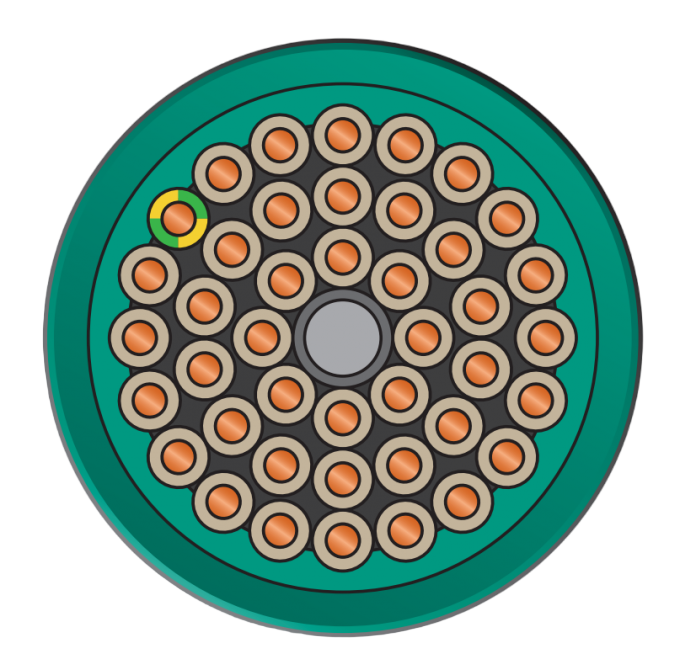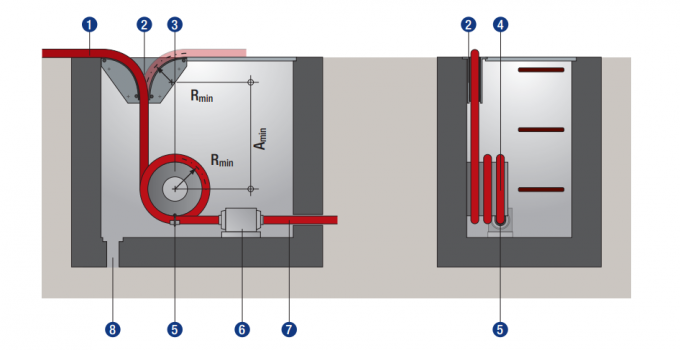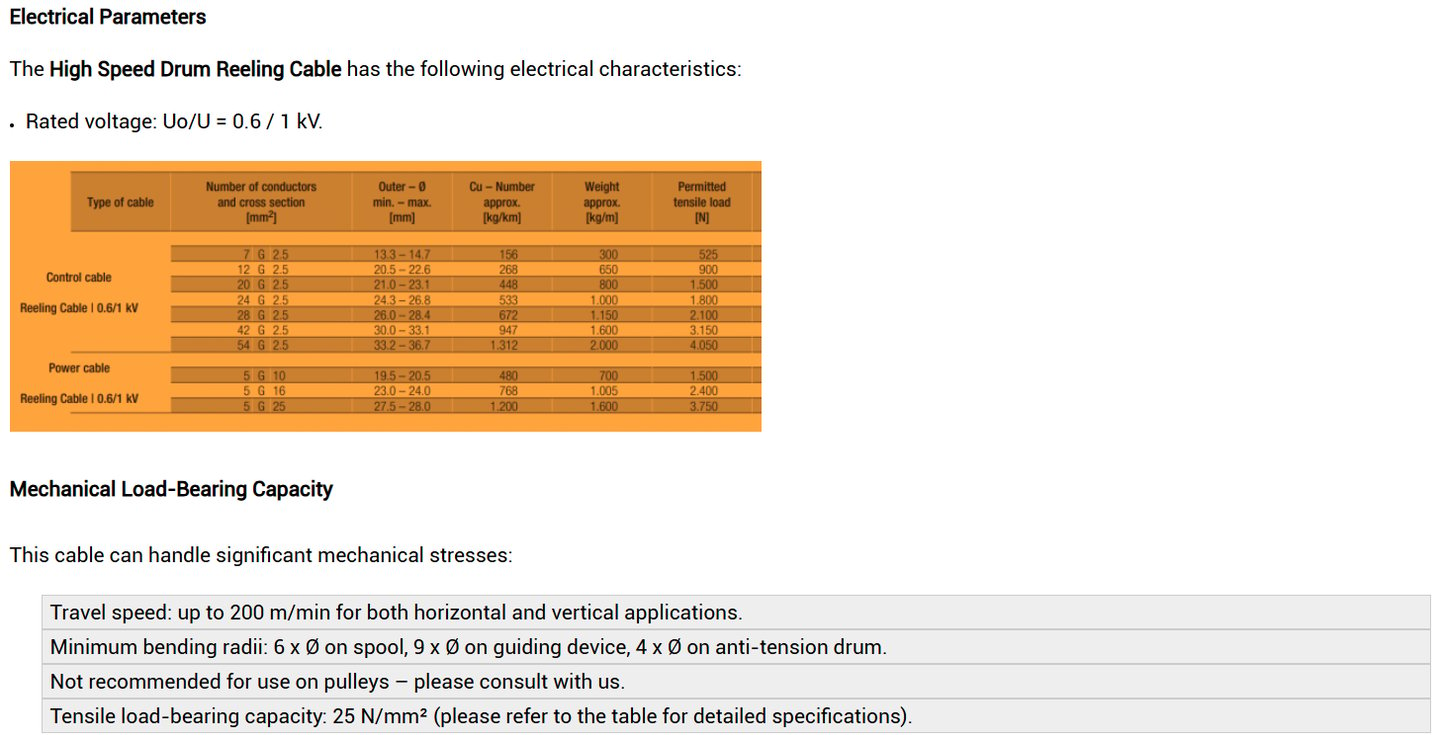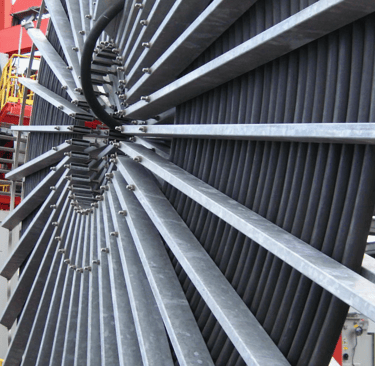📞+86 153 7530 2641 📧 hongjing.Wang@feichuncables.com

High Speed Drum Reeling Abrasion-Resistant Polyurethane Cable for 200m/min | AS/NZS 2802
Looking for a durable solution for high-speed electric drive reels? Discover how abrasion-resistant polyurethane cables engineered for speeds up to 200 m/min offer unmatched performance, flexibility, and lifespan in demanding reeling systems.
hongjing.Wang@Feichun
7/21/20256 min read
Introduction
In the fast-paced world of industrial operations, reliable cable systems are the backbone of efficiency, particularly in high-demand environments like ports, cranes, and automated reeling systems. These settings require cables that can endure rapid movement, frequent bending, and exposure to harsh conditions such as saltwater, UV radiation, and mechanical stress. Among the materials used for cable sheaths, polyurethane stands out for its exceptional durability, flexibility, and resistance to environmental challenges, making it a top choice for high-speed drum reeling cables.
This article provides a detailed exploration of abrasion-resistant polyurethane cables, focusing on their role in electric drive reel cables and their suitability for applications requiring speeds up to 200 m/min cable for reeling systems. Tailored for an Australian audience, it covers their features, technical specifications, benefits, and comparisons with traditional rubber-sheathed cables, while addressing compliance with relevant standards and ideal use cases. Whether you're managing port cranes or industrial machinery, this guide will help you understand why high-speed polyurethane cables for electric drive reels are a game-changer.


What Is a High-Speed Drum Reeling Cable?
A high-speed drum reeling cable is a specialized flexible cable designed to handle the dynamic stresses of continuous reeling and unreeling at speeds up to 200 meters per minute (m/min). Unlike standard reeling cables, which are suited for slower or less demanding applications, these cables are engineered to maintain structural integrity and performance under rapid movement, significant torsional stress, and frequent bending.
These cables are critical in environments where equipment must operate swiftly and reliably, such as port operations involving ship-to-shore (STS) cranes, rubber-tired gantry (RTG) cranes, and electric RTGs (E-RTGs). Their ability to perform at high speeds without compromising safety or reliability sets them apart, making them a cornerstone of modern port and industrial operations.
Key Features of the Polyurethane Sheath
The polyurethane sheath is a defining feature of polyurethane reeling cables, offering a range of advantages that make them ideal for high-speed applications:
Exceptional Abrasion Resistance: The double polyurethane sheath, often reinforced with an embedded textile anti-twisting braid, provides superior protection against wear and tear, ensuring longevity in abrasive environments like ports and industrial sites.
High Tensile Strength and Tear Resistance: These cables can withstand significant mechanical stress, with tensile strengths up to 100 Lbs and tensile load-bearing capacities of 25 N/mm², making them robust enough for heavy-duty applications.
Resistance to Harsh Conditions: Polyurethane insulated cables for rapid motion reeling are halogen-free, ozone-resistant, oil-resistant, and UV-resistant, making them suitable for both indoor and outdoor use across diverse Australian climates, from coastal ports to arid mining regions.
Flame Retardancy and Weather Durability: Compliance with standards like IEC 60332-1 ensures low smoke emission and flame retardancy, enhancing safety in fire-prone environments.
These features make abrasion-resistant polyurethane cables a reliable choice for demanding applications where durability and performance are non-negotiable.
Performance in Electric Drive Reels Operating at 200 m/min
In electric drive reel cables, performance under high vibration, acceleration, and retraction is critical. Drum reeling cables with abrasion resistance for 200 m/min are designed with minimum bending radii (e.g., 6xØ on spool, 9xØ on guiding device, 4xØ on anti-tension drum), allowing them to flex and twist without damage. This ensures a long flex life and resistance to torsion, which is essential for maintaining operational efficiency.
The ability to handle speeds up to 200 m/min is particularly valuable in port operations, where cranes must load and unload ships quickly to meet tight schedules. The cable’s construction—featuring flexible copper conductors (class 5 per IEC60228), polypropylene core insulation, and a black polyurethane outer sheath—ensures it can withstand the mechanical stresses of high-speed reeling while delivering consistent power and signal transmission.
Technical Specifications Snapshot
To provide a clear understanding of electric cables with polyurethane sheath for heavy-duty reeling drives, the following table outlines the key technical specifications of a typical high-speed drum reeling polyurethane cable:
Specification Details
Rated Voltag Uo/U = 0.6 / 1 kV
Travel Speed Up to 200 m/min (horizontal and vertical)
Minimum Bending Radii 6xØ on spool, 9xØ on guiding device, 4xØ on anti-tension drum
Tensile Strength 100 Lbs
Tensile Load-Bearing Capacity 25 N/mm²
Weight 0.26 Lbs/ft
Ambient Temperature (Flexing) -25°C to +60°C
Ambient Temperature (Fixed) -30°C to +60°C
Operational Temperature at Conductor Up to 80°C
Short Circuit Temperature at Conductor 200°C
Shielding Coverage 100%
Armor Type Galvanized Steel
Conductor Flexible copper class 5 (IEC60228 / VDE 0295 / BSI 6360)
Sheath Highly abrasion-resistant polyurethane
Core Insulation Polypropylene
Outer Sheath Color Black




These specifications ensure the cable can operate efficiently and safely across a wide range of conditions, from extreme temperatures to high-speed reeling applications.
Benefits in Port Machinery and Industrial Applications
Durable reeling cable solutions for port and industrial cranes offer several key benefits that enhance operational efficiency:
Reduced Downtime: The exceptional durability and abrasion resistance of polyurethane cables minimize the need for frequent replacements, reducing costly downtime in port and industrial operations.
Lower Maintenance Costs: The robust construction requires less maintenance, leading to significant cost savings over the cable’s lifespan.
Consistent Performance: Even at high reeling speeds, these cables maintain reliable signal and power transmission, ensuring smooth and efficient operations in applications like STS cranes, RTGs, and stacker/reclaimer systems.
These advantages make polyurethane cables a valuable asset in industries where reliability and efficiency are critical, such as Australia’s busy ports and mining sectors.
Comparison: Polyurethane vs. Rubber Sheath Reeling Cables
When comparing polyurethane reeling cables to traditional rubber-sheathed cables, several key differences emerge:
Abrasion Resistance: Polyurethane offers superior abrasion resistance compared to rubber, resulting in a longer lifespan in abrasive environments like ports and mining sites.
Weight and Flexibility: Polyurethane cables are generally lighter and more flexible, which is advantageous in applications where maneuverability and reduced equipment weight are important.
Cost-Effectiveness: While polyurethane cables may have a higher initial cost, their durability and reduced maintenance needs make them more cost-effective over time, particularly in high-speed applications.
These factors highlight why high-speed polyurethane cables for electric drive reels are often preferred for demanding industrial and port applications.


Certifications and Compliance Standards
High-speed drum reeling cables must meet rigorous international standards to ensure safety and performance. For example, the FeiChun™ Reeling Cable is certified to VDE 0250 Part 814, a widely recognized standard for reeling cables. Additionally, these cables are often halogen-free and comply with standards such as CE and RoHS, making them suitable for global markets, including Australia.
In Australia, electrical installations must adhere to AS/NZS 3000:2018, known as the Wiring Rules, which outline requirements for safe electrical installations. While there may not be a specific Australian standard for drum reeling cables, VDE-certified products are generally accepted due to their international recognition and compliance with high safety standards. Suppliers can also offer customization to meet specific Australian requirements, ensuring compatibility with local regulations.
When Should You Choose This Cable Type?
High-speed polyurethane cables for electric drive reels are ideal for applications requiring durability, speed, and reliability. Key use cases include:
Port Operations: STS cranes, RTGs, E-RTGs, shiploaders, and stacker/reclaimer systems, where high-speed reeling and harsh environmental conditions are common.
Industrial Machinery: Conveyors, hoists, and other equipment requiring frequent reeling in manufacturing and processing plants.
Mining and Tunneling: Where cables must withstand abrasive conditions, high mechanical stress, and exposure to chemicals or oils.
Automation Systems: Where reliable power and data transmission at high speeds are essential for automated processes.
When choosing these cables, consider environmental factors such as temperature, humidity, and exposure to chemicals, as well as the required reeling speed. For Australian ports and industries, where conditions can range from coastal humidity to arid heat, polyurethane cables offer a versatile and robust solution.
Conclusion and Recommendation
In conclusion, drum reeling cables with abrasion resistance for 200 m/min and polyurethane sheaths offer unmatched performance, durability, and reliability for demanding applications in ports, industries, and automation. Their ability to handle high speeds, resist abrasion, and withstand harsh conditions makes them an excellent choice for enhancing operational efficiency and reducing maintenance costs.
When selecting a supplier or manufacturer, choose one that provides cables meeting international standards like VDE 0250 Part 814 and offers customization options to meet specific needs. Upgrading to these advanced cables can significantly improve the performance and longevity of reeling systems, ultimately leading to better operational outcomes in Australia’s industrial and port sectors.
For those managing port cranes or industrial machinery, investing in electric cables with polyurethane sheath for heavy-duty reeling drives is a strategic decision that can enhance productivity and reduce long-term costs. Consult with reputable suppliers to ensure the cable meets your specific requirements and complies with Australian standards.
FAQ
Q1: What makes polyurethane cables ideal for high-speed drum reeling applications?
A1: Polyurethane cables are ideal due to their superior abrasion resistance, high tensile strength, and ability to withstand harsh environmental conditions. They maintain performance under rapid movement and frequent bending, making them perfect for high-speed operations.
Q2: What is the maximum reeling speed supported by this cable type?
A2: These cables can support reeling speeds up to 200 meters per minute, suitable for electric reel drives in demanding environments like port cranes.
Q3: Can this cable be customized for voltage or conductor size?
A3: Yes, customization is available based on specific industrial or port requirements, allowing for tailored solutions to meet unique needs.
How to Reach Us
Get in Touch
SiteMap
Product Catalogue
Reeling Cable
Festoon Cable
Shore Power Cable




Scan to add us on WeChat
